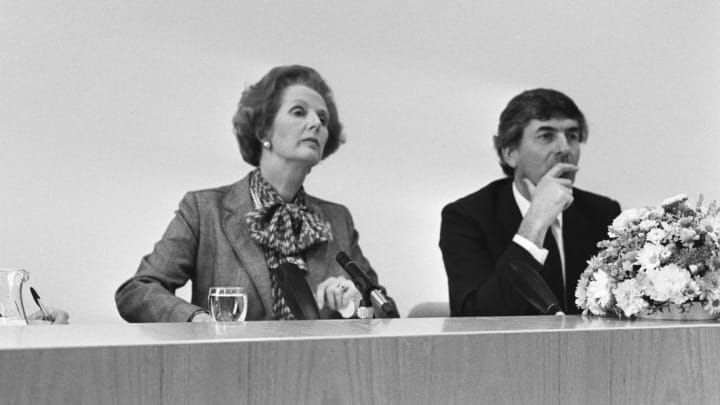Whenever Netflix releases a new season of The Crown, curious viewers spend a lot of time wondering—and Googling to find out—if certain events actually happened. In the case of Margaret Thatcher’s missing son, covered in season 4, it really did.
In his mid-twenties, Mark Thatcher launched a career as a race car driver and competed in the 1980 Le Mans. While there, he was asked to drive a Peugeot 504 in the Paris-Dakar Rally (now known simply as the Dakar Rally), which was then a relatively new race in the Sahara Desert. He agreed, but the promise promptly slipped his mind. When the race rolled around in January of 1982, the 28-year-old decided to keep his word, since the chance to speed across the Sahara seemed too good to pass up.
“I did absolutely no preparation. Nothing,” Thatcher later wrote for The Guardian. “By day three we are in the desert on long, long stages, spending hours aiming at something very small on the horizon … I [remember] thinking, two days before we stopped, that this could all go very badly wrong.”
The car broke down on January 9, leaving Thatcher, his co-driver, and their mechanic completely stranded in the desert—and when the other racers reported their position to the authorities at the end of the stage, they accidentally directed them east instead of west. After a night with no sign of a rescue party, Thatcher mentally prepared to be stuck there for as long as two weeks. They had enough water to last them for four weeks, plus “a little bit of dried food.” Thatcher passed the time by reading and re-reading a book.
Meanwhile, the Algerian military spearheaded a massive mission to recover the missing racers, and Thatcher’s father, Denis, arrived from the UK to join the search. According to The Guardian, a “strained and anxious” Margaret Thatcher began crying when someone inquired about her son before a luncheon; and President Ronald Reagan even phoned her on January 14 to offer moral support.
“It's been a long time, and we've had a lot of confused rumors and reports but Denis is out there now, and the Algerians have mounted a very big search today,” Margaret told Reagan. “I've just had news two minutes ago that they believe they've made a hopeful sighting.”
An Algerian plane had indeed spotted the marooned companions, who immediately set off a flare. “The Algerians had a well-organized, well-structured plan,” Thatcher wrote. “Within minutes two Land-Rovers appeared.” According to Bustle, they were 31 miles from the race course, which helps explain why it took six days to locate them.
But the international search-and-rescue operation hadn’t been cheap. Though the Algerian government covered most of the costs, the British government was still responsible for £1191. After conferring with her political advisors, Margaret Thatcher decided to settle the bill with personal funds. “I must pay the £1191. We can therefore say that no extra cost has fallen on the British taxpayer,” she wrote in a note. Another £583 was owed for her husband’s involvement in the search, and her total came to £1785.
“I must say I hope this is the last of Mark’s motor racing,” said his twin sister, Carol, according to Radio Times. “Having seen the strain Mum has suffered this week, she can do without this additional hassle.”
Thatcher’s racing career did stall after that, but he didn’t totally give up his passion for luxury automobiles. He moved to Texas to sell cars in the mid-1980s, and ended up marrying Diane Burgdorf, whose father owned a lucrative car dealership.
[h/t Bustle]
